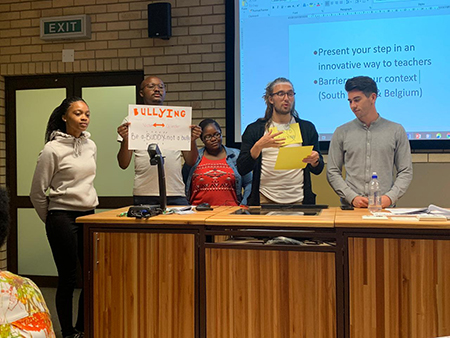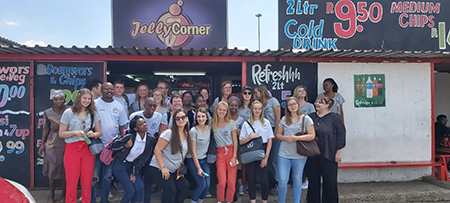The programme represents a dynamic collaboration between the NWU and Vives College of Applied Sciences in Belgium and offers students from Europe and Africa, as well as from different professional disciplines, the opportunity to experience international and interdisciplinary interaction.
This year saw the inaugural event, as agreed upon after the signing of a Memorandum of Understanding (MoU) in 2018, hosted by the NWU on its campus in Vanderbijlpark.
Leading the charge were Prof Mirna Nel and her Belgium counterpart, Dr Nele van de Putte. As project leaders they coordinated the interdisciplinary team comprising of practicing professionals, experts and students in social work, psychology, education, industrial psychology and nursing.
Creating awareness across global boundaries
In explaining the value of the programme, Prof Nel says that the central goal of SIP is to create an awareness among scholars in different fields of study that ideas, concepts, perspectives and approaches across different disciplinary and contextual boundaries, can add broader and deeper insight into the understanding of their own disciplines and professions.
“In an intricate and complex global social world there is a need to develop and enable students in disciplines linked to humanities and health to merge a disciplinary depth and also to appreciate the contribution of other disciplines to be able to work in interdisciplinary teams,” she explains.
Tackling the social phenomenon of bullying
After intensive deliberation between the project leaders and interdisciplinary teams in 2018, it was decided that the topic of SIP2019 will be around the social phenomenon of bullying, with particular focus on children between 12 to 14 years.
During the two week run of the programme, the following activities – with research as a secondary objective – were hosted:
-
Knowledge and experience sharing
Students and lecturers exchanged knowledge and experiences about their higher education programmes and practices in general, but also focusing on interdisciplinary teamwork and how contextual factors are addressed in their respective studies.
- Interactive workshops
Several workshops were presented and facilitated by NWU lecturers within the faculties of Humanities, Health Sciences, Education and Economic and Management Sciences. During these workshops attendees were capitated with knowledge and understanding about inclusion and wellbeing linked to bullying from different disciplinary and contextual perspectives.
- Informal institutional visits
As part of the programme the visiting students from Belgium and their South African counterparts visited a number of institutions in Sharpeville, including primary schools, work centres and local clinics. These visits enabled students to explore their understanding and experiences of interdisciplinary teamwork and the importance of contextual factors linked to the topic of bullying.
Based on the knowledge and understanding gained during the different activities the students developed a guideline programme on how to address bullying in an interdisciplinary and inclusive manner, while keeping contextual factors in mind. This programme will be used to inform pre-service, as well as in-service training programmes.

Students from the NWU and Vives College of Applied Sciences in Belgium teamed-up to address and explore the social phenomenon of bullying.

Participants in SIP2019 visited several institutions in Sharpeville.
